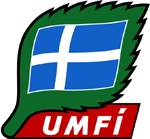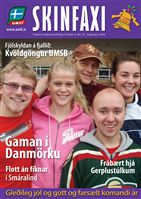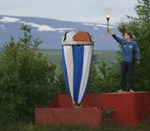UMFÍ, the Icelandic Youth Association
The Icelandic Youth Association (UMFÍ) is the national association of local youth associations in Iceland. Founded in 1907, their objective is to “cultivate the people and the country”, and their slogan is “everything for Iceland”.

This means cultivating the best in every individual as well as diligently working for the promotion of the Icelandic language and culture and the protection of the country’s natural environment. UMFÍ’s pride in their homeland is reflected in their banner; the white and blue flag that was the first pennant of independent Iceland.
UMFÍ’s role is to co-ordinate the activities of the Icelandic youth associations and offer services to their associate associations and members. Furthermore, UMFÍ represents the youth associations in external relations, for example when dealing with the authorities and foreign bodies.
Their associated partners are 19 district societies and 10 directly linked organizations. UMFÍ covers a total of 263 associations with approximately 81,000 members. They emphasise that everybody can take part and that membership is a lifestyle
A brief history of UMFÍ
The Icelandic Youth Association (UMFÍ) was founded at Thingvellir on 2 August 1907, while the first local youth association was founded in Akureyri in early 1906.
The vision of the youth associations spread like wildfire throughout the country; the fight for a better country and a better nation were taken up right away under the slogan “the cultivation of the people and the country.”
The organisation immediately gained widespread influence in society, increasing people’s public spirit and their belief in the land and nation. UMFÍ’s members started to cultivate forests, build swimming pools and meeting halls, construct facilities for sports activities, promote general meetings and debating societies where people could learn the art of public speaking.
The struggle began for the construction of secondary schools, which then became the foundation of education in the rural areas. There was hardly anything UMFÍ’s members did not get involved in if it served the country and its people.

In 1909, UMFÍ began publishing the magazine Skinfaxi, which is still going strong.
In 1911, the banker Tryggvi Gunnarsson gave UMFÍ an expansive piece of land near Álftavatn lake. This area was given the name Thrastaskógur (Wood of the Thrushes), and is one of the most beautiful areas in south-western Iceland.
UMFÍ’s first national meetings also started in 1911 and were held on two occasions before 1940. From that point onward, meetings have been held uninterrupted every three years, and have now been held a total of 23 times. At these events, thousands of UMFÍ members gather to compete with each other. These meetings have been called the Icelandic Olympics, being the largest and most impressive sports tournament held in Iceland.
In 1992, UMFÍ initiated National Youth Sports Meetings, and nine such meetings had been held up until 2006. As of 2002, such meetings have been held every year during Iceland’s biggest travel weekend, the bank holiday on the first Monday in August.The Icelandic Youth Association operates a Service Centre at Laugavegur 170 in Reykjavík, which serves their 80,000 plus members. UMFÍ’s activities take place across the country, supporting widely diverse cultural programmes.
While sports play a major part, many other activities are also carried out. For example, many of UMFÍ’s associations are very active as amateur theatre clubs. Numerous associations are active in environmental programmes, members having carried out comprehensive work in this field.

In many areas, youth associations play an important role in youth activities under the auspices of local governments and carry out various projects in co-operation with them. UMFÍ is also very active in foreign relations, mostly with the other Nordic countries.
More information on UMFI can be found at their homepage (website is in Icelandic)





